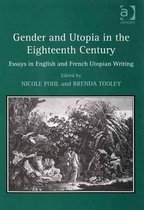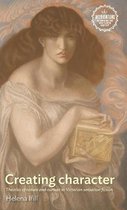Love and Eugenics in the Late Nineteenth Century Rational Reproduction and the New Woman
Afbeeldingen
Sla de afbeeldingen overArtikel vergelijken
Uitgever: Oxford University Press
- Engels
- Hardcover
- 9780198187004
- 22 mei 2003
- 250 pagina's
Angelique Richardson
Angelique Richardson is a lecturer in English at the University of Exeter. She has published widely on nineteenth-century fiction and is the author of
Love, Eugenics and the N
ew Woman: Science, Fiction, Feminism (OUP, 2003). She is also co-editor of
The New Woman in Fiction and in
Fact: Fin-de-Siècle Feminisms (Palgrave, 2001). She writes regularly for the TLS, has written a number of entries for the New Dictionary of National Biography , and reviews for the leading international journals in nineteenth-century studies, including
Victorian Studies and the
Journal of Victorian Culture.
Samenvatting
Exploring the pervasiveness of eugenic ideas in fin-de-siecle Britain, and recontextualizing New Woman fiction, 'Love and Eugenics in the Late Nineteenth Century' makes a radical contribution to 19th-century studies, establishing the intimate relations between early feminism and eugenics.
The idea of eugenics - human selective breeding - originated in Victorian Britain in response to the urban poor. Darwin's evolutionary theory had laid the foundations for eugenics, replacing paradise with primordial slime. Man had not fallen from Grace, but risen from the swamps. And, as architect of his own destiny, he might rise still further. Eugenics was developed by Darwin's cousin Francis Galton in the 1860s. Embracing the idea of evolution, eugenists argued that through the judicious control of human reproduction, and the numerical increase of the middle class, Britain's supremacy in the world could be maintained. Born and bred among the competitive Victorian middle class, eugenics was a biologistic discourse on class. Aiming at 'racial improvement' by altering the balance of class in society, it was, Galton argued, 'practical Darwinism'. Eugenics found its most sustained expression in fiction and the periodical press, and was central to late nineteenth-century ideas on social progress, forming part of the debate between hereditarians and environmentalists that peaked in the closing years of the century. Even Gladstone had his vital statistics measured in Galton's eugenic laboratory. Among the champions of eugenics were social purity feminists and New Women, writers such as George Egerton, Ellice Hopkins, and Sarah Grand, who argued that women were naturally - biologically - moral, and that through rational reproduction middle-class women could regenerate the British imperial race. The New Woman has been the subject of numerous recent critical works. However, the oppressive ideas that coexisted with the mancipatory theories of some New Women - ideas that were supremely class conscious - remain largely unexamined, as the focus remains on her more progressive aspects. Love and Eugenics in the Late Nineteenth Century recontextualizes New Woman writers, demonstrating that they were as concerned with the questions of poverty, sickness and health as they were with the changing role of women, the issue for which they are currently generally known and celebrated. Focusing on fiction and the press, and drawing on the papers and published work of Galton and other eugenists, Angelique Richardson reveals the cultural pervasiveness of eugenics and explores, for the first time, the intimate relations between early feminism and eugenics, and making a radical contribution to nineteenth-century studies.
The idea of eugenics - human selective breeding - originated in Victorian Britain in response to the urban poor. Darwin's evolutionary theory had laid the foundations for eugenics, replacing paradise with primordial slime. Man had not fallen from Grace, but risen from the swamps. And, as architect of his own destiny, he might rise still further. Eugenics was developed by Darwin's cousin Francis Galton in the 1860s. Embracing the idea of evolution, eugenists argued that through the judicious control of human reproduction, and the numerical increase of the middle class, Britain's supremacy in the world could be maintained. Born and bred among the competitive Victorian middle class, eugenics was a biologistic discourse on class. Aiming at 'racial improvement' by altering the balance of class in society, it was, Galton argued, 'practical Darwinism'. Eugenics found its most sustained expression in fiction and the periodical press, and was central to late nineteenth-century ideas on social progress, forming part of the debate between hereditarians and environmentalists that peaked in the closing years of the century. Even Gladstone had his vital statistics measured in Galton's eugenic laboratory. Among the champions of eugenics were social purity feminists and New Women, writers such as George Egerton, Ellice Hopkins, and Sarah Grand, who argued that women were naturally - biologically - moral, and that through rational reproduction middle-class women could regenerate the British imperial race. The New Woman has been the subject of numerous recent critical works. However, the oppressive ideas that coexisted with the mancipatory theories of some New Women - ideas that were supremely class conscious - remain largely unexamined, as the focus remains on her more progressive aspects. Love and Eugenics in the Late Nineteenth Century recontextualizes New Woman writers, demonstrating that they were as concerned with the questions of poverty, sickness and health as they were with the changing role of women, the issue for which they are currently generally known and celebrated. Focusing on fiction and the press, and drawing on the papers and published work of Galton and other eugenists, Angelique Richardson reveals the cultural pervasiveness of eugenics and explores, for the first time, the intimate relations between early feminism and eugenics, and making a radical contribution to nineteenth-century studies.
Productspecificaties
Wij vonden geen specificaties voor jouw zoekopdracht '{SEARCH}'.
Inhoud
- Taal
- en
- Bindwijze
- Hardcover
- Oorspronkelijke releasedatum
- 22 mei 2003
- Aantal pagina's
- 250
- Illustraties
- Nee
Betrokkenen
- Hoofdauteur
- Angelique Richardson
- Tweede Auteur
- Angelique Richardson
- Hoofduitgeverij
- Oxford University Press
Overige kenmerken
- Editie
- illustrated edition
- Extra groot lettertype
- Nee
- Product breedte
- 144 mm
- Product hoogte
- 20 mm
- Product lengte
- 224 mm
- Studieboek
- Ja
- Verpakking breedte
- 144 mm
- Verpakking hoogte
- 25 mm
- Verpakking lengte
- 224 mm
- Verpakkingsgewicht
- 449 g
EAN
- EAN
- 9780198187004
Je vindt dit artikel in
- Categorieën
- Taal
- Engels
- Boek, ebook of luisterboek?
- Boek
- Beschikbaarheid
- Leverbaar
- Periode
- ca. 1800-1910
Kies gewenste uitvoering
Kies je bindwijze
(2)
Prijsinformatie en bestellen
De prijs van dit product is 162 euro en 22 cent. Dit is een tweedehands product.Alleen tweedehands
Goed
Ref2573
Ref2573
1 - 2 weken
Verkoop door
BAY EXPRESS
- Bestellen en betalen via bol
- Prijs inclusief verzendkosten, verstuurd door BAY EXPRESS
- 30 dagen bedenktijd en gratis retourneren
Rapporteer dit artikel
Je wilt melding doen van illegale inhoud over dit artikel:
- Ik wil melding doen als klant
- Ik wil melding doen als autoriteit of trusted flagger
- Ik wil melding doen als partner
- Ik wil melding doen als merkhouder
Geen klant, autoriteit, trusted flagger, merkhouder of partner? Gebruik dan onderstaande link om melding te doen.









